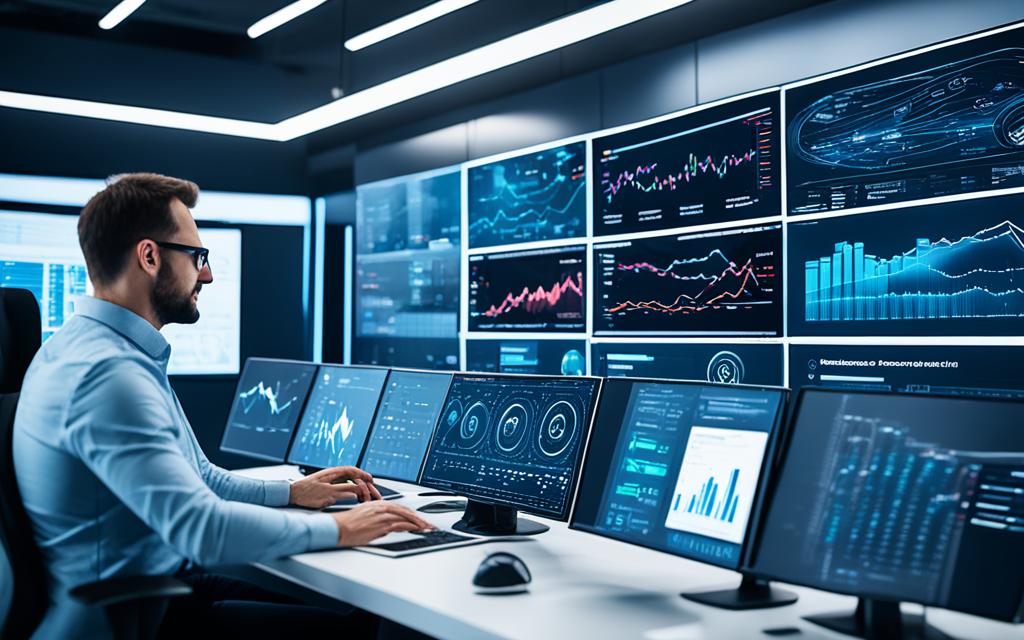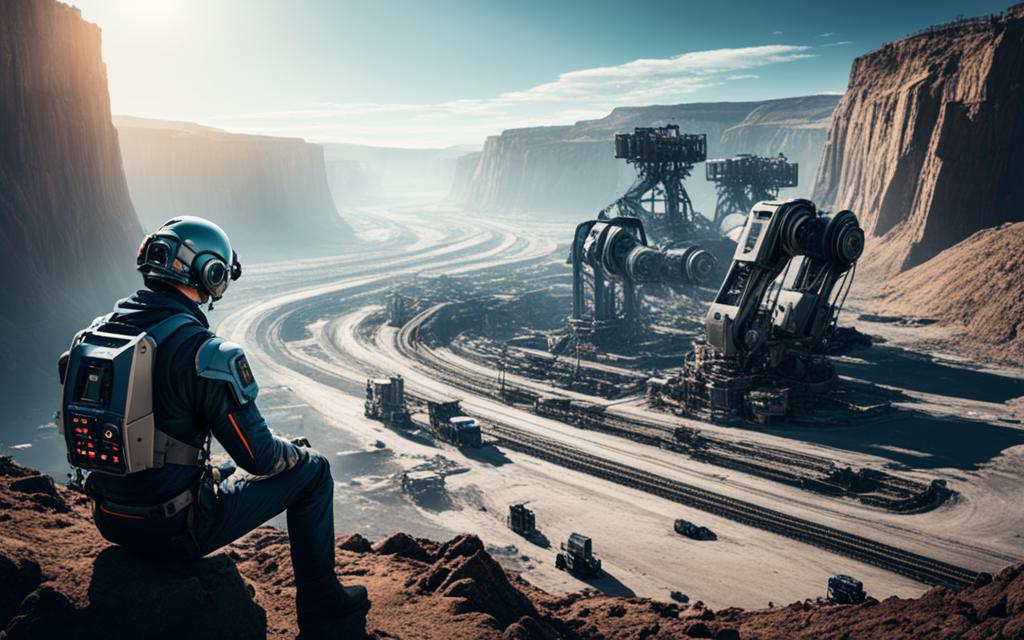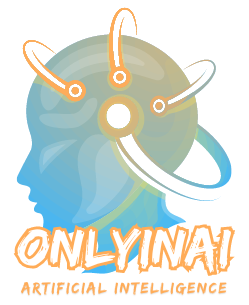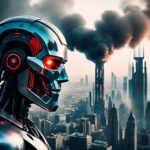Did you know that artificial intelligence could add $14 trillion to the global economy by 2035? This shows how big of an impact AI is having on our economy. We’ll look into how this technology is changing industries, making things more efficient, and creating new jobs worldwide.
AI is changing many areas like healthcare, finance, and transportation. It makes things more efficient, automates tasks, and helps make better decisions. We’ll see how AI is not just changing industries but also the economy as a whole.
Countries like China and the United States are leading in using AI in the economy. But what does this mean for businesses, workers, and shoppers? We’ll look into how AI changes our economy on a big scale. This will help us understand the link between AI and economic growth.
Key Takeaways
- AI is projected to add $14 trillion to the global economy by 2035
- AI enhances productivity through automation and process optimization
- China and North America are expected to see significant economic gains from AI
- AI is transforming various industries including healthcare, finance, and manufacturing
- The technology has the potential to increase labor productivity by up to 40% in some sectors
Understanding Generative AI and Its Economic Potential
Generative AI is changing the game in many industries. It makes content on its own, leading to big gains in productivity. This tech is a game-changer across sectors.
What is Generative AI?
Generative AI works by using complex algorithms to create new content like text, images, and music. It learns from huge amounts of data to act like a human creator. This tech is changing how we work, make things, and innovate.
Economic Growth Projections
Experts say generative AI could add $15.7 trillion to the global GDP by 2030. This growth comes from being more efficient and opening up new markets. But, we need to focus on training workers as AI takes over some jobs.
Industries Revolutionized by Gen AI
Generative AI is making a big splash in many areas:
- Healthcare: Cutting down on medical mistakes and helping with staff shortages
- Finance: Making risk assessment and catching fraud better
- Manufacturing: Making production smoother
- Retail: Tailoring shopping experiences to customers
- Entertainment: Creating new kinds of media and content
These changes are leading to huge gains in productivity. For example, in healthcare, AI is making diagnoses more accurate and treatment plans better. AI personal assistants are making tasks easier across industries, making things more efficient.
As generative AI keeps getting better, it’s changing our economy. The big challenge is using its power wisely while thinking about the impact on society and making sure growth is fair.
AI-Driven Productivity Enhancement in Various Sectors
AI is changing the game in many industries. It’s making healthcare and manufacturing more efficient and innovative. Let’s see how AI is making a big difference in key sectors.
In healthcare, AI is a lifesaver. Hospitals using AI have seen a 20% drop in sepsis deaths. This technology is saving lives and showing the power of AI in healthcare.
Manufacturing is also benefiting from AI. Smart factories use AI to make products better and waste less. This means big cost savings and more products made.
Retailers are using AI to get smarter. AI helps manage inventory and market products better. Chatbots offer help all day, and AI predicts what customers will want.
Supply chain management has changed thanks to AI. AI predicts what’s needed and makes logistics better. This leads to lower costs and faster delivery times, making things more efficient.
| Sector | AI Application | Productivity Gain |
|---|---|---|
| Healthcare | Sepsis detection algorithms | 20% reduction in deaths |
| Manufacturing | Smart production systems | Improved quality, reduced waste |
| Retail | AI-powered customer service | 24/7 support, personalized marketing |
| Supply Chain | Predictive inventory management | Lower costs, faster deliveries |
As AI keeps getting better, we’ll see even more productivity gains. The impact of AI on the economy is clear. It promises a future with more efficiency and innovation.
The Dual Nature of AI’s Impact on Employment
AI’s effect on jobs is complex, with both good and bad sides. As technology gets better, jobs change in many fields.
Job Displacement Concerns
AI is making some jobs obsolete. Many jobs that are routine or repetitive might be taken over by AI. This could change jobs in manufacturing, customer service, and data entry a lot.
Creation of New Job Opportunities
But AI isn’t just taking jobs away; it’s also creating new ones. These jobs often need skills in AI development, data analysis, and machine learning. The tech industry is growing, with a big need for AI experts.
Skills Gap and Workforce Transition
The fast growth of AI has left many workers without the right skills. Many need to learn new things to keep up in the job market. This time of change is key to tackling issues like ai and wealth inequality.
| Sector | Jobs at Risk | New Opportunities |
|---|---|---|
| Manufacturing | Assembly line workers | Robotics maintenance specialists |
| Finance | Bank tellers | AI risk analysts |
| Healthcare | Medical transcriptionists | AI-assisted diagnostic technicians |
We need to focus on education and learning new skills. This can lessen the bad effects of AI on jobs and make sure its benefits are shared fairly.
AI as a Catalyst for Innovation and Competitive Advantage
AI is changing the game in many industries by sparking new ideas and creating new competition. Companies using AI get ahead in making products, serving customers, and running smoothly.
In healthcare, AI looks through huge amounts of medical data to spot diseases early and accurately. This leads to better health outcomes for patients and puts healthcare providers ahead in the game.
AI is changing how we market and advertise. It studies what customers like and don’t like to make ads that hit the mark. This makes customers happier and more loyal, helping companies stand out.
AI is opening up new chances for entrepreneurs in many fields. Startups are coming up with AI solutions for things like:
- Financial forecasting and risk assessment
- Supply chain optimization
- Energy management and sustainability
- Education and personalized learning
These new ideas are not just creating new markets but also shaking up old ones. This means companies need to keep up or get left behind.
| Industry | AI Application | Competitive Advantage |
|---|---|---|
| Retail | Inventory management | Reduced costs, improved stock availability |
| Manufacturing | Predictive maintenance | Minimized downtime, increased productivity |
| Finance | Fraud detection | Enhanced security, reduced losses |
As AI keeps getting better, its impact on innovation and staying ahead will get even bigger. Companies that jump on the AI bandwagon are setting themselves up for success in a world driven by technology.
How Does AI Our Economic Systems: Transforming Market Structures
AI is changing our economy, making big changes in how industries work and market structures. This tech change brings both good and bad sides, especially in how AI affects the economy.
Changes in Industry Dynamics
AI is changing old business models. It makes it easier for new companies to start in some areas but makes it harder in others. This is changing the way companies compete in many industries.
Impact on Small and Medium Enterprises
Small and medium enterprises (SMEs) are facing big challenges with AI. AI can bring new chances for growth, but it’s also very expensive to use advanced AI. This could make some businesses fall behind.
Potential for Market Concentration
The impact of AI also affects market structures. Big companies with lots of money for AI might get ahead, leading to more market control. This could make competition unfair and hurt economic diversity.
| Aspect | Impact of AI |
|---|---|
| Entry Barriers | Lowered in some industries, increased in others |
| SME Challenges | High implementation costs, adaptation difficulties |
| Market Concentration | Potential increase due to advantages for large firms |
| Gig Economy | Disruption of traditional work models |
The ai gig economy disruption is another big change. AI is altering work, offering new chances in the gig economy but also challenging traditional jobs.
AI’s Role in Enhancing Decision-Making Processes

AI is changing how we make decisions in many industries. It uses a lot of data to give insights we couldn’t get before. This change is making businesses work smarter and plan better.
In finance, AI is changing how we manage risks. These systems quickly look at market trends, spot fraud, and find good investment chances. Using ai risk management finance tools helps companies make better choices and keep up with market changes.
AI’s predictive skills are very useful in many areas. It looks at past data and current trends to predict the future with great accuracy. This helps businesses:
- Anticipate market changes
- Predict consumer behavior
- Identify potential risks early
- Optimize resource allocation
AI’s effect on decision-making is clear in fast-moving industries. Being able to quickly spot and adapt to changes is crucial. AI analytics give businesses the edge they need to stay ahead.
| Decision-Making Area | AI Impact |
|---|---|
| Strategic Planning | Enhanced long-term forecasting |
| Risk Management | Improved threat detection and mitigation |
| Customer Relations | Personalized engagement strategies |
| Supply Chain | Optimized inventory and logistics |
As AI gets better, its role in decision-making will expand. Companies that use ai data-driven decision making and ai risk management finance tools are getting ready to succeed in a tough global market.
Global AI Competition and Its Economic Implications
The race for AI dominance is changing the global economy. Countries around the world are racing to lead in AI development. They see its power to boost economic growth and innovation.
Leading Countries in AI Development
The United States and China lead in AI innovation, with Japan not far behind. They file a lot of AI patents, showing their dedication to AI tech. Their investments in AI are clear from their growing tech sectors and higher productivity in many industries.
The EU’s Position in the Global AI Race
The European Union is facing challenges in keeping up with AI leaders. It has a strong industrial base and skilled workers, but its AI inventions have dropped over the last decade. This could affect the EU’s economic future.
Importance of Data Accessibility
Having lots of different data is key for AI development. Countries with a lot of similar data have an edge in training AI. The EU’s data is spread out, which is a problem. But, working on a unified data strategy could help the EU in the AI race.
As the AI competition grows, countries need to use their strengths to stay ahead. The impact of AI on the economy will likely change industries, job markets, and global power in the future.
Economic Challenges and Risks Associated with AI Adoption

AI is changing our economy in big ways. It brings both good and bad changes. The fast growth of AI makes us worry about its effects on society and the economy.
Potential for Increased Economic Inequality
AI might make the rich get richer and the poor get poorer. Companies that use AI first could get ahead, causing ai and wealth inequality. People with AI skills might earn more, but others could lose their jobs.
Ethical Considerations and Their Economic Impact
Ethical problems in AI can hurt the economy a lot. Privacy issues and biased algorithms can make people lose trust in companies. To stay successful, companies need to use AI responsibly.
Regulatory Challenges in the AI Era
Lawmakers have a tough job with AI. They need to balance new tech with safety. Good strategies for managing AI risks are key to growth without problems.
| Challenge | Economic Impact | Potential Solution |
|---|---|---|
| Wealth Inequality | Widening income gap | Progressive taxation, AI-focused education |
| Ethical Concerns | Loss of consumer trust | Transparent AI development, ethical guidelines |
| Regulatory Uncertainty | Slowed innovation | Adaptive regulation frameworks |
We need to work together to solve these problems. Governments, businesses, and society must join forces. By addressing these issues early, we can use AI’s benefits and reduce its risks. This way, we can build a future that’s fair and prosperous for everyone.
Strategies for Harnessing AI’s Economic Benefits
To get the best from AI’s economic effects, businesses and governments need smart strategies. It’s important to create a work culture that supports AI. This means always learning and focusing on what’s best.
Companies, schools, and the government should work together. They can share resources and use their strengths better. This teamwork opens up new chances for ai entrepreneurship.
It’s also key to invest in AI research and make data easy to use. Good rules are needed to help AI grow safely. These rules should protect people but not slow down progress.
By following these strategies, we can fully use AI’s potential. This approach will boost the ai economic impact across many industries. It will create new jobs and make businesses more efficient.


